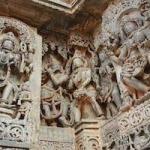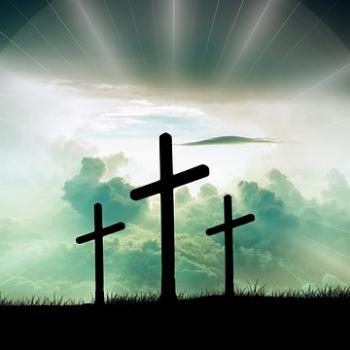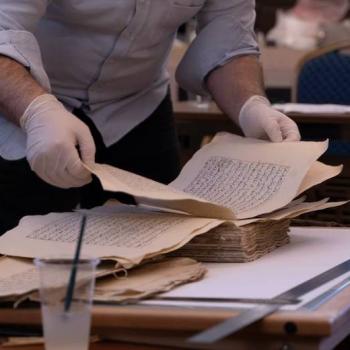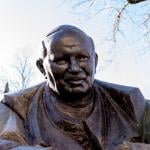
THE RELIGION GUY’S ANSWER
The quote above is the headline for an article this month by Ginny Baxter, the “Woman to Woman” blogger on patheos.com. She figures “the answer is a definite ‘maybe’.” See www.patheos.com/blogs/womantowoman/2023/06/did-jesus-have-brothers-sisters/.
On this age-old but ever-debated topic, The Guy would answer that it depends on what church is fielding the question. From ancient times, Catholicism and Orthodoxy have said no. They believe in Mary’s “perpetual virginity,” meaning that she and husband Joseph never had sexual relations and Jesus was the only child she ever gave birth to.
(This issue should not be confused with Christianity’s belief in the “virginal conception” or “virgin birth,” that Mary conceived Jesus miraculously without a biological human father, as recorded in the Gospels of Matthew and Luke.)
In the early Protestant Reformation, Martin Luther broke from Catholicism on numerous matters, including mandatory celibacy for priests, but continued to believe that Mary was “ever-virgin,” although personally and not as a required doctrine. Virtually all Protestants since his time have answered yes, Jesus did have siblings.
Gospels and a “Proto-Gospel”
The New Testament does not mention that Mary was “ever-virgin.” Jesus’ (adoptive) father Joseph was present with Mary when Jesus taught in the Temple at age 12 (see Luke 2:41-50). But then Joseph disappears from the Gospels’ narratives, so interpreters assume he died at some point before Jesus began his public ministry around age 30.
The ”Proto-Gospel of James,” probably composed in the late 2nd Century A.D., may have been the first writing to depict an ever-virgin Mary. This is one of many later accounts of Jesus that the early church excluded from the New Testament as questionable or false.
In succeeding times, “Church Fathers” both affirmed and denied the concept, but it was embraced by influential 4th and 5th Century theologians such as Athanasius, Basil the Great, Ambrose, Jerome, and Augustine. By A.D. 553, the Council of Constantinople, recognized as ecumenical and authoritative by Catholicism and Orthodoxy, called Mary aeiparthenos (Greek for ever-virgin) and condemned those who denied this belief.
Orthodox and Catholic authorities and liturgies across the centuries since have affirmed Mary as “ever-virgin.” The popularity of the tenet was a natural accompaniment of the spread of monasticism with its vow of chastity for monks, and it was thought to underscore Mary’s sanctity.
A one-word issue: “Until”
U.S. Catholicism’s official Bible, like Protestant translations, states that Joseph “had no relations with her [Mary] until she bore a son” (Matthew 1:25). To Protestants, that clearly indicates that they had relations afterward. A footnote in “The Catholic Study Bible” says the Greek word for until “does not imply normal marital conduct after Jesus’ birth, nor does it exclude it.”
A second key New Testament text is Mark 6:3 and the parallel in Matthew 13:55. There, Jesus’ astonished hometown listeners ask, “is he not the carpenter, the son of Mary, and the brother of James and Joses and Judas and Simon? And are not his sisters here with us?”
The Gospels do not name the sisters or tell us how many there were, but later church tradition said there were two, named Mary and Salome. There are other New Testament mentions of the brothers and sisters, without naming them.
(Belief in the virginal conception of Jesus, of course, means they would have been half-brothers and half-sisters, born of the same mother with different fatherhood.)
Brother James subsequently led the church in Jerusalem and worked through policy when Paul, Peter, and their colleagues began taking the message of Jesus Christ to non-Jews. He was martyred in A.D. 62.
The current Catholic catechism teaches that these six or more were not children of the Virgin Mary. Again, a “Catholic Study Bible” footnote explains that the words “brother” and “sister” could also mean other close relatives such as a cousin, niece or nephew. Another perpetual virginity theory holds that Joseph was a widower who brought into the home these siblings from a first marriage and served as Mary’s protector in old age without engaging in sexual relations.
Vigorous dissent comes from, among others, Professor James Tabor, a prolific scholar who retired last year from the University of North Carolina at Charlotte. And Tabor adds a surprising twist to the discussion. See https://jamestabor.com/sorting-out-the-jesus-family-mother-fathers-brothers-and-sisters/.
Enter father Clopas?
He contends that “no one in the early church even imagined such an idea” as perpetual virginity, which is absent in both the New Testament and Christianity’s earliest creeds. Mary was “a normally married Jewish woman,” he asserts. To think otherwise would make Mary “totally removed from her 1st Century Jewish culture and context in the interest of an emerging view” that sexuality was unholy or at best “a necessary evil.” This, he says, violates the Bible’s teaching that God’s material creation is good.
Tabor’s twist is a “plausible” scenario, “though one can ever know with certainty,” that the father of some or all of Jesus’ siblings could have been Joseph’s brother Clopas (mentioned in John 19:25), particularly if tradition is correct that Joseph was an older man who left Mary as a widow. As bizarre as that seems, the 4th Century church historian Eusebius recorded a tradition from the 2nd Century chronicler Hegesippus that Clopas was Joseph’s brother. The Bible’s welfare plan called “levirate marriage” (Deuteronomy 25:5-10) prescribed that an unmarried brother was obliged to marry his brother’s widow and thus provide for her and her children.
Interesting speculation, for sure, and you’ll have fun exploring Tabor’s intricate biblical names games. Problem is, there is a total lack of corroboration in the New Testament or the annals of the early church – the central reason that Tabor himself discards perpetual virginity!













